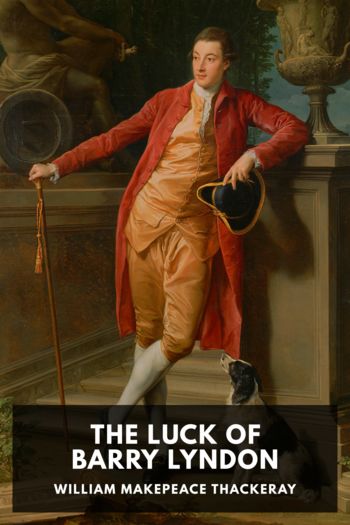Vanity Fair by William Makepeace Thackeray (best thriller novels to read TXT) 📕

- Author: William Makepeace Thackeray
Book online «Vanity Fair by William Makepeace Thackeray (best thriller novels to read TXT) 📕». Author William Makepeace Thackeray
Max and Fritz came presently downstairs, their caps on one side, their spurs jingling, their pipes splendid with coats of arms and full-blown tassels, and they hung up the key of No. 90 on the board and called for the ration of butterbrod and beer. The pair sat down by the Major and fell into a conversation of which he could not help hearing somewhat. It was mainly about “Fuchs” and “Philister,” and duels and drinking-bouts at the neighbouring University of Schoppenhausen, from which renowned seat of learning they had just come in the Eilwagen, with Becky, as it appeared, by their side, and in order to be present at the bridal fêtes at Pumpernickel.
“The title Engländerinn seems to be en bays de gonnoisance,” said Max, who knew the French language, to Fritz, his comrade. “After the fat grandfather went away, there came a pretty little compatriot. I heard them chattering and whimpering together in the little woman’s chamber.”
“We must take the tickets for her concert,” Fritz said. “Hast thou any money, Max?”
“Bah,” said the other, “the concert is a concert in nubibus. Hans said that she advertised one at Leipzig, and the Burschen took many tickets. But she went off without singing. She said in the coach yesterday that her pianist had fallen ill at Dresden. She cannot sing, it is my belief: her voice is as cracked as thine, O thou beer-soaking Renowner!”
“It is cracked; I hear her trying out of her window a schrecklich English ballad, called ‘De Rose upon de Balgony.’ ”
“Saufen and singen go not together,” observed Fritz with the red nose, who evidently preferred the former amusement. “No, thou shalt take none of her tickets. She won money at the trente and quarante last night. I saw her: she made a little English boy play for her. We will spend thy money there or at the theatre, or we will treat her to French wine or cognac in the Aurelius Garden, but the tickets we will not buy. What sayest thou? Yet, another mug of beer?” and one and another successively having buried their blond whiskers in the mawkish draught, curled them and swaggered off into the fair.
The Major, who had seen the key of No. 90 put up on its hook and had heard the conversation of the two young University bloods, was not at a loss to understand that their talk related to Becky. “The little devil is at her old tricks,” he thought, and he smiled as he recalled old days, when he had witnessed the desperate flirtation with Jos and the ludicrous end of that adventure. He and George had often laughed over it subsequently, and until a few weeks after George’s marriage, when he also was caught in the little Circe’s toils, and had an understanding with her which his comrade certainly suspected, but preferred to ignore. William was too much hurt or ashamed to ask to fathom that disgraceful mystery, although once, and evidently with remorse on his mind, George had alluded to it. It was on the morning of Waterloo, as the young men stood together in front of their line, surveying the black masses of Frenchmen who crowned the opposite heights, and as the rain was coming down, “I have been mixing in a foolish intrigue with a woman,” George said. “I am glad we were marched away. If I drop, I hope Emmy will never know of that business. I wish to God it had never been begun!” And William was pleased to think, and had more than once soothed poor George’s widow with the narrative, that Osborne, after quitting his wife, and after the action of Quatre Bras, on the first day, spoke gravely and affectionately to his comrade of his father and his wife. On these facts, too, William had insisted very strongly in his conversations with the elder Osborne, and had thus been the means of reconciling the old gentleman to his son’s memory, just at the close of the elder man’s life.
“And so this devil is still going on with her intrigues,” thought William. “I wish she were a hundred miles from here. She brings mischief wherever she goes.” And he was pursuing these forebodings and this uncomfortable train of thought, with his head between his hands, and the Pumpernickel Gazette of last week unread under his nose, when somebody tapped his shoulder with a parasol, and he looked up and saw Mrs. Amelia.
This woman had a way of tyrannizing over Major Dobbin (for the weakest of all people will domineer over somebody), and she ordered him about, and patted him, and made him fetch and carry just as if he was a great Newfoundland dog. He liked, so to speak, to jump into the water if she said “High, Dobbin!” and to trot behind her with her reticule in his mouth. This history has been written to very little purpose if the reader has not perceived that the Major was a spooney.
“Why did you not wait for me, sir, to escort me downstairs?” she said, giving a little toss of her head and a most sarcastic curtsey.
“I couldn’t stand up in the passage,” he answered with a comical deprecatory look; and, delighted to give her his arm and to take her out of the horrid smoky place, he would have walked off without even so much as remembering the waiter, had not the young fellow run





Comments (0)